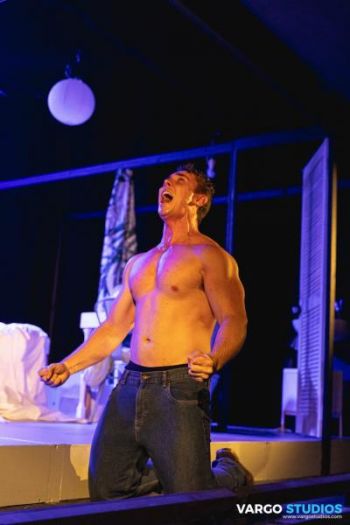A Streetcar Named Desire
Tennessee Williams is an icon amongst American playwrights, but not an easy one to relate to. His writing vacillates between lyrical and mellifluous and OTT high campery which is a stretch for even the finest actors. One could argue that his voice is no longer relevant, except that his writing thematically is about exploring sexuality…and isn’t that always relevant?
In Streetcar, Williams explores sexual violence and brutish, toxic masculinity. The subject is as relevant today as it was in 1948 when the play first appeared. Domestic violence is on the increase, smart informed women are more at risk from their partners than ever before, and we ask the question - in this day and age - why? The story of the once gentile Blanche who has fallen from grace, and her sister Stella, held in sexual thrall by the brutish Stanley, may seem melodramatic, but most of us can identify with it at some level through family or friends.

Spotlight, noted for its musical productions, is brave to approach such a play, and confidently place it in the care of a young director, the uber talented Hunter Wall. It won’t be everybody’s cup of tea (or something stronger) but it is a production worth seeing, and it has a standout performance.
Kate Retzki is normally found in Musical Theatre and it is hard to believe this is her first dramatic role. As Blanche she gives a fine rendition of Williams’ histrionic heroine, unstable and teetering on the edge of madness until her encounter with Stanley tips her over the edge. Her final scenes are compelling and nerve wracking, her trauma totally credible. She mesmerises with her fluttering hands, the slight crack in the southern accent and her overall vulnerability, buried behind her outward vanity. It is a bravura performance in what is one of the most difficult roles ever written for an actress. We can only hope to see her in another such dramatic role soon.

On the night I viewed the play her sister Stella was played by the understudy Emma Andrews with warmth and intelligence. She is suitably earthy and sensual and one could easily believe that she would endure Stanley’s violence because their sex life more than compensated for it. Considering it was her first time in the role, it was way beyond what I expected and I truly wouldn’t have known her status had I not been told.
Stanley himself is an enigma as written. Does he truly know no better than to explode in anger and violence? Certainly, they were common traits of toxic masculinity in the wake of WWII when the play was written, traits we would now call PTSD. But violence against women was also commonplace. And sex has been at the heart of most man/woman problems since Eve handed Adam that bloody apple … if only it had been a banana! Stanley is well liked by the men around him, but is he aware of his magnetic sexuality? Dale Shearman certainly looks the part. He is physically imposing with a booming voice and great diction. He masters the volcanic eruptions of temper, but there’s an overall lack of sexual tension between him and the two main actresses, and that does tend to lessen the dynamic between the three. When a male’s power over women rests largely in his loins, and holding them in sexual thrall,that sexual tension should be apparent,like pheromones. Dale could certainly have gone further in displaying that magnetism, but kudos to him for the simmering violence and frustration, whilst remaining a seemingly good bloke to his mates.
There’s a lovely rendition of Mitchell – perhaps the only truly sympathetic character in the play – by Alexander O’Connell. He gives us a Mitch who is naïve and not very bright, a young man terrified that his mother is dying and he’ll have no-one to look after him. But he also adds another layer, a depth to the character that is essentially out of step with the toxicity around him. Decency. I enjoyed his performance enormously.

There is great support from Michelle Watkins and Johnny Lawler as the couple upstairs who settle all their arguments with make-up sex, and, in minor roles, the stunning Isabel Laver and Christian Romano are both impressive.
As both director and designer, Wall has cleverly constructed a set which allows for peripatetic movement, as though we are exploring a neighbourhood, rather than simply stuck in two rooms. It’s a clever device which includes actors using the front area of the auditorium as part of the neighbourhood. The soundscape (Wall again) and the lighting design by Leonnie Jones play heavily on the reality, or banality, of the world inhabited by Williams’ heightened, almost fantasy like, characters. The lights and sounds of the train, the noises of the suburb, voices heard through thin walls, music on the radio, all create a world that we recognize even if we wouldn’t want to live there.

It's exciting to see any new emerging director at work, and Hunter Wall has certainly made his mark with this production, even if the move to present day was un-necessary – we would still have understood the relevance of the central theme. I hope Wall’s new love of direction doesn’t mean we lose him as a performer. He is far too impressive on stage to lose, but I’m also looking forward to his next outing as Director.
It's always a good night out at Spotlight, the bar and the cheese platters all add to the pleasure of seeing dedicated volunteers at every level providing top entertainment to the community.
Coral Drouyn
Subscribe to our E-Newsletter, buy our latest print edition or find a Performing Arts book at Book Nook.

